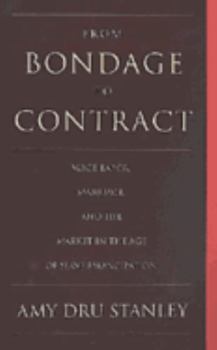From Bondage to Contract: Wage Labor, Marriage, and the Market in the Age of Slave Emancipation
Select Format
Select Condition 
Book Overview
In the era of slave emancipation no ideal of freedom had greater power than that of contract. The antislavery claim was that the negation of chattel status lay in the contracts of wage labor and marriage. Signifying self-ownership, volition, and reciprocal exchange among formally equal individuals, contract became the dominant metaphor for social relations and the very symbol of freedom. This 1999 book explores how a generation of American thinkers...
Format:Paperback
Language:English
ISBN:0521635268
ISBN13:9780521635264
Release Date:November 1998
Publisher:Cambridge University Press
Length:294 Pages
Weight:0.92 lbs.
Dimensions:0.7" x 6.0" x 9.0"
Customer Reviews
1 rating
Whose Work is Never Done
Published by Thriftbooks.com User , 24 years ago
This excellent study of nineteenth-century American households brings Hannah Arendt's assessment of the home as a place of labor and violence clearly into view. Amy Dru Stanley looks at the spread of contractarianism into household relations and finds not improvement but rather a different basis for wringing effort from subordinates to enrich and comfort their masters. Defenders of the south's peculiar institution used similar arguments with regard to labor, comparing the "wage slaves" in the north to the real slaves of the south, always in favor of the latter. Stanley's assessment is more nuanced, valuing individual freedom while remaining sensitive to the grinding hardships this freedom brought with it. The heart of her argument is her close analysis of the relations of dependency between slaves and masters and husbands and their wives and children. While the movement to free slaves had widespread support among many social groups, the movement to free wives, like today's movement to free children, was seen very differently. Indeed, slave emancipators held out the prospect to freedmen of being kings in their own castles, of holding their wives and children in bondage to themselves just as their white masters held their slaves and the members of their own families, to encourage them to leave their masters following emancipation. Yet for the freedmen, the money to be kings in their castles was lacking, and freedwomen had to labor as long and hard in freedom as they had in bondage to keep their poor households going. As a result, many resisted playing their assigned parts in the freedmen's family romance. Meanwhile, their poor white sisters faced similar economic constraints. Free labor during the era governed by the "iron law of wages" condemned workers' families to penury and, in extreme cases, pushed wives and daughters into prostitution as their only alternative to destitution. Stanley's informative discussion of the personal cost of commodification of labor to individuals and their families provides many opportunities to consider other results of this process on human existence.





